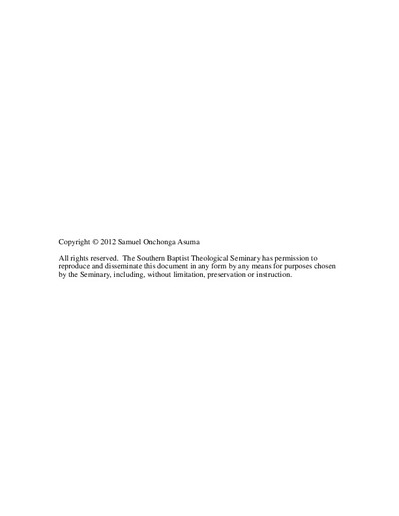| dc.description.abstract | SPEECH ETHICS IN THE HEBREW PSALTER
Samuel Onchonga Asuma, Ph.D.
The Southern Baptist Theological Seminary, 2012
Chairperson: Duane A. Garrett
This dissertation examines the use of speech terminology in the Hebrew Psalter in order to find out why the terminology is used frequently and what it teaches about speech ethics. Also, it seeks to determine the Psalter's contribution to the study of Old Testament ethics in general.
Chapter 1 discusses the problem, purpose, thesis, and the methodology of the study. Chapter 2 briefly looks at the history of the study of Old Testament ethics during the modern era beginning from the nineteenth century to the present, paying special attention to how it developed into an independent discipline and the key issues that have dominated scholarly discussion along with the underlying philosophical ideas that inform that discussion.
Chapter 3 examines the occurrence of speech terminology outside the Hebrew Psalter, using select passages from the Pentateuch, prophetic and wisdom literature in order to determine what these passages teach about the proper use of speech.
Chapter 4 discusses briefly whether or not the Psalter contains ethical instruction. In answering the question, it takes into consideration the approaches taken by pre-critical interpreters and form and canonical critics. Chapter 5 examines the use of speech terminology in the Hebrew Psalter with the aim of finding out why it is used frequently and what the Psalter teaches about speech ethics.
Chapter 6 summarizes the findings of the study and proposes an answer to the question as to why the Psalter has more references to the use of speech than any other book in the Old Testament. It suggests the contribution the Psalter makes to the study of Old Testament ethics. Finally, proposals are made regarding areas for further research.
This work contends that speech terminology features prominently in the Psalter not only because the Psalter places strong emphasis on truthful speech but also because speech is used by the wicked as a weapon of oppression. The powerful members of society devise evil schemes and put them into effect using false accusation, false testimony, false oaths, slander, and humiliation against the weak. Since the weak do not have any human being or institution to protect them, they appeal for justice from God as the righteous king and judge. | en_US |

